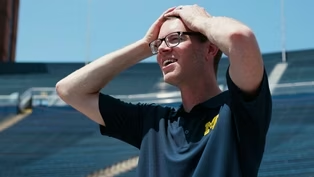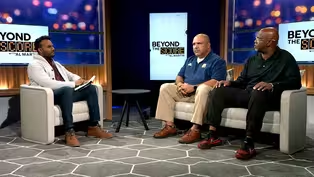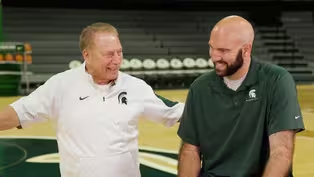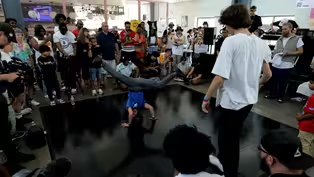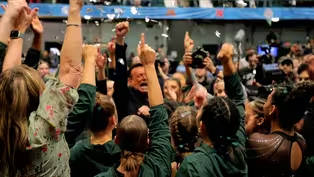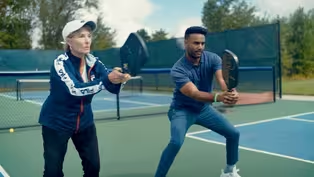
CLIP: Making Space
Clip | 10m 55sVideo has Closed Captions
Anthony Ianni shares his experiences playing and watching basketball with autism.
Former MSU Basketball player Anthony Ianni tells Al Martin about sensory spaces, how they help people with sensory processing disorders experience things like sporting events. They visit the Breslin Center sensory room, and talk about the impact of inclusion both on and off the court. Plus, Coach Tom Izzo drops in to share his insights. This story is part of Beyond The Score, Season 1 Episode 3.
Problems playing video? | Closed Captioning Feedback
Problems playing video? | Closed Captioning Feedback
Beyond the Score with Al Martin is a local public television program presented by WKAR
Supported in part by Capital Insurance Services

CLIP: Making Space
Clip | 10m 55sVideo has Closed Captions
Former MSU Basketball player Anthony Ianni tells Al Martin about sensory spaces, how they help people with sensory processing disorders experience things like sporting events. They visit the Breslin Center sensory room, and talk about the impact of inclusion both on and off the court. Plus, Coach Tom Izzo drops in to share his insights. This story is part of Beyond The Score, Season 1 Episode 3.
Problems playing video? | Closed Captioning Feedback
How to Watch Beyond the Score with Al Martin
Beyond the Score with Al Martin is available to stream on pbs.org and the free PBS App, available on iPhone, Apple TV, Android TV, Android smartphones, Amazon Fire TV, Amazon Fire Tablet, Roku, Samsung Smart TV, and Vizio.
Providing Support for PBS.org
Learn Moreabout PBS online sponsorshipEvery senior that has worn Michigan State men's basketball jersey heads to the nosebleeds, looking to sink an impossible shot.
For decades, each one has hurled the leather spiral through the air in hopes of seeing it go through the net.
This is Anthony Ianni.
A name etched in Michigan State history, not just for his heigh & hoops talent on the hardwood, but for his heart.
He became the first Division I men's basketball player with autism, and his journe has been anything but ordinary.
I want to start by just kind of taking in this.
We're on the court of the Breslin Center.
You're smiling.
And I know there's so many emotions.
So many emotions g through your body and your mind when you think about this place.
What are those emotions?
Joy?
A lot of hard work, blood, sweat and tears went into putting some of these championship banners in here.
And I guess relief because, you know, this is the place I always want to be.
Well, you know, from the very beginning, there was just something a little unique about him when he was having a meltdown or a tantrum.
It had to just happen.
Now, looking at my granddaughters, it might be 20 minutes an for him, it might last all day.
Wow.
And anything could cause that.
A guest teacher at school.
The school bus wa a horrible experience for him.
Anthony's family found a developmental pediatrician in Ohio who was able to pinpoint exactly what was going on.
He said all of his tendencies are all of his idiosyncrasies and all of his behavior issues are related to pervasive developmental disorder, which is now we know in the umbrella of autism.
Anthony grew up a Spartan.
His father, Greg, who was a former MSU baseball player, was hired to the Michigan State Athletic Department in the early nineties.
While Dad was working, his mother, Jamie, would take him t countless MSU sporting events, including, of course, college basketball games.
I'm curious, where would you guys sit?
Section 106, row 20.
That was your seat.
Seats 101 through 104.
Those were our seats.
Wow.
That's where their seats were for 20, 23 years.
So you grew up in that section?
I grew up in that section.
I grew up in that section watching heartbreakers.
Fantastic finishes, championships.
I've been to six out of those eight Final Fours.
But for anyone with autism spectrum disorder, attending sporting events can prove to be a challenging experience especially for young children.
What is that like?
What would happen to you?
I'm sure you ever shake and coke bottle before an explosion.
Just an explosion.
That was me right there.
Because you throw buzzer, crowd, lights, aren all into one and it's shaken up.
And all of a sudden you open a bottle up in the back.
And then I just freak out.
Lights.
loud noises, and textures.
All ever presen stimuli for fans in the stands.
But those with AS can be sensitive to all of them.
Social skills, such as relating to people and holding conversation also proved to be difficult.
Anthony's older sister, Allison, became a safe haven.
I was always trying to shield him from situations before they could occur.
Anthony just had a tendency when we were younger to make statements that he thought were funny, that really weren't, or they were just they didn't make sense in the situation.
And so people would often take tha and use that to poke fun at him.
When you were bullied growing up, your sister was, oh yeah, you're protected.
She was there.
What did she mean to you?
Not just during that time, but even now as well.
Oh, everything.
She understood me better than anybody.
And whenever her friends would just kind of bully me or tease me lik she was always quick to step in.
And so even today, one thing that hasn't changed is how much she still has my back and how much she has been there for me.
It helped me get to where I am today.
Basketball.
Anthony's other safe space.
A sport which turned into an escape.
Well, he started playing out when he was in elementary school league down here at Okemos.
And they always identify the biggest kid.
Right.
And so he was that guy.
He wasn't included in things with his classmates because he was different.
And basketball made him feel like he's one of the guys because they didn't care who he was.
All they cared about was you could play basketball.
And when Anthony got ingrained into basketball culture and was at the first time that you guys saw Anthony truly belong to a group?
Oh, no question.
When you told your team they embraced you especially especially Johnathan Jones Yeah.
JJ took me under his wing right away because from when he was on varsity his freshman year, he saw a lot of him when it came to me.
I didn't know a lot of those guys, but they embraced me like I quickly became the little brother of that group.
And when I first told JJ about my autism, he like, he he's like, dude, I don't care.
Like, it's that doesn't define you.
"...Convention Center.
6'10" Junior #44 Anthony Ianni."
That acceptance helped Anthony to flourish on the court.
He turned out to be so good that while at Okemos High School, he quickly became on of the top players in the area.
One of his standout games cam when he helped lead the school to the Class A state title game against Saginaw Arthur Hill.
Anthony, a 6'10" center, poured in 23 points and nine rebounds.
Okemos would fall short.
But it was clear that Anthony had a chance at playing ball at the college level with Anthony's father, Greg, going on to become deputy athletic director at Michigan State, that allowed him to attend MSU basketball practices where he got to know basketball Hall of Fam head coach Tom Izzo pretty well.
You were really young going t Coach Izzo's office and saying, I'm going to play for you.
Hey, I want to be on this roster.
You remember that, coach?
What what was your reaction to that, seeing this little kid say, hey, coach, I'm going to play for you when I get bigger?
Yeah, that was my reaction, right?
Right.
It was cute at the time, bu I thought he was crazy at first.
But I think that's the beauty of this story is that he did.
I did.
He did.
Anthony became the first known college basketball player with autism, spending two seasons at Grand Valley State University.
He would then transfer to MSU.
Izzo admits that coaching Anthony forced him to grow as a coach and person.
A coach's jo is to teach players something, and in his case, it was a player's job to teach the coach something.
You know, and had no idea how to deal with it.
I mean, ignorantly, if you want the truth, just a no no knowledge of it.
So probably I think early on, you know, just kind of let him do his own thing and and that that wasn't my personality and probably wasn't what you wanted.
So that changed quickly.
In what way?
In what way did it change?
I got on hi just as well as I got Draymond.
And that's what I mea about teaching me something.
And I can think of different guys that had different things to overcome.
And he made me believe you can overcome.
Okay, here we are.
The Spartan Family Sensory roo opened in the fall of last year.
The space acts as a quiet place for fans to take a break from the overstimulation that can be present at basketball games and other public events at the Breslin Center.
The room helps those with sensory issues by using objects, special lighting and music.
Anthony pioneered its construction after seeing how common the rooms started becoming around the nation.
So I immediately called Michigan State.
I said hey, the Warriors did their Sensory Room in a janitor's closet; do we have anything like that?
So about a year later he calls me - "I got a space."
Michigan Stat became the first Big Ten school in the entire conference to have a sensory room in its arena.
Wow.
I really wanted to bring the inclusion piece back to our university and that sensory room.
It's just.
It's not that big of a room, but it's a big deal to a lot of other people on this campus.
In creating this safe, calming space, Anthony's helping little Anthony, the one who sat in Section 106, row 20 and who needed just a little extra help.
Anthony is now school administrator in Detroit, a renowned motivational speaker and author and father.
He credits his tribe for everything, offering love strength and fierce protection.
What are you the most proud of when it comes to Anthony?
I think probably the thing I'm most proud o is the human being that he is.
Just how he's just a kind, compassionate, empathetic, amazing young person.
He loves working with those kids, and I think he feels like he's making a difference.
A lot of people don't get that opportunity in their lives, and I just couldn't be prouder.
You can look in the record books and you might not see his name plastered all over it, but I always thought he loved the game.
You know, people sometime play it for different reasons.
What the game can do for them instead of what they can do for the game.
I thought he looked at it an what he could do for the game.
Video has Closed Captions
Clip | 7m 35s | Al Martin visits The Big House to find out what it's like to become an internet sensation. (7m 35s)
CLIP: Panel Discussion on Mental Health Awareness
Video has Closed Captions
Clip | 5m 10s | James Moore and Terry Hessbrook talk in-studio about athletes and mental health. (5m 10s)
Video has Closed Captions
Clip | 10m 55s | Anthony Ianni shares his experiences playing and watching basketball with autism. (10m 55s)
Video has Closed Captions
Clip | 8m 58s | Terry and Kristy Hessbrook share their son’s story, raising awareness about mental health. (8m 58s)
Video has Closed Captions
Clip | 7m 36s | Hip hop fundamentals build community in Lansing and around the world. (7m 36s)
Video has Closed Captions
Clip | 13m 4s | Al Martin learns about the people behind the meteoric rise of MSU Gymnastics. (13m 4s)
PREVIEW: Beyond the Score with Al Martin | Series Pilot
Video has Closed Captions
Preview | 30s | WKAR’s Al Martin explores stories where sports and society intersect. (30s)
PREVIEW: Beyond the Score with Al Martin | Pickleball
Video has Closed Captions
Preview | 30s | Coming Dec 14. Pickleball surges in Michigan thanks to its cross-generational appeal. (30s)
Providing Support for PBS.org
Learn Moreabout PBS online sponsorship
- News and Public Affairs

Top journalists deliver compelling original analysis of the hour's headlines.

- News and Public Affairs

FRONTLINE is investigative journalism that questions, explains and changes our world.












Support for PBS provided by:
Beyond the Score with Al Martin is a local public television program presented by WKAR
Supported in part by Capital Insurance Services
